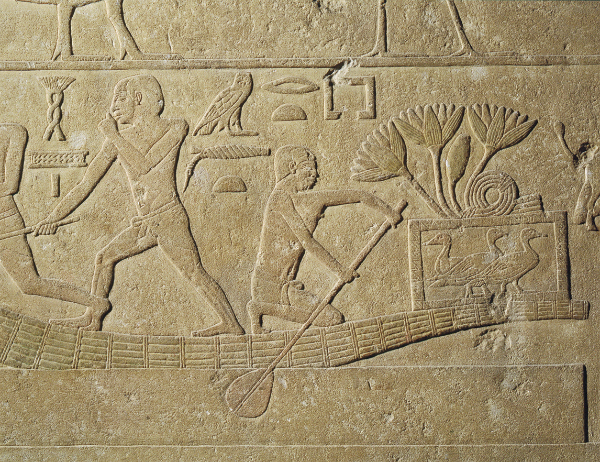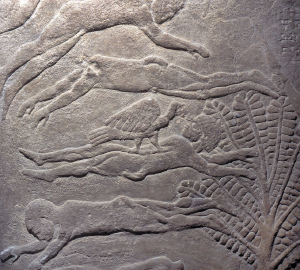Oracle against Cush (18:1–7)
Cush (18:1–7). In the Old Testament, Cush refers to two different areas. The Kassites lived in Mesopotamia (2:13), while Cush also refers to the territory immediately south of Egypt, the territory in view here. Translated in the LXX as “Ethiopia,” Cush probably lies north and west of what we know today as Ethiopia—that is, in what is now northern Sudan, ancient Nubia, populated by black African people.512
Early in the history of Cush, its northern boundary was between the first and second Nile cataracts, though later it was pushed a bit further south.513 Egypt and its neighbor to the south were constantly jockeying for power in the region. In the late eighth and early seventh centuries B.C., during the Third Intermediate Period, the Twenty-Fifth (Ethiopian) Dynasty controlled Egypt and had contact with Israelite rulers (e.g., 2 Kings 17:4).514
Akkadian texts refer both to Kus and to Meluhha (Nubia). Sargon made several campaigns to the west against a group of anti-Assyrian allies, probably including Judah and Cush.515 One of his inscriptions speaks of a person named Yamanni who fled Sargon’s approaching army: “He fled to the border area of Egypt which is on the border with Meluhha.”516 References to either “Egypt” or “Cush” in Isaiah most likely refer to this dynasty. They challenged Assyria’s territorial expansion to the west, including Israel.
Land of whirring wings (18:1). Locusts or other flying insects plague the Middle East (see Joel), and another occurrence of the same Hebrew term refers to such creatures (Deut. 28:42). These could be used to describe Cush, which undoubtedly suffered locust infestations, but it is curious that such a ubiquitous feature should define a distant nation. The LXX and the Targums interpret the term as a kind of boat, possibly another referent to the swiftly darting crafts of 18:2. The Egyptians, and by implication, the Cushites, used boats with sails,517 whose flapping would sound like the whirring of many insect wings.
Envoys (18:2). International relations were influenced by both military encounters and diplomatic contact (see comments on 6:9; 39:7). While the former receive the greatest mention in the texts, the latter was also important in trying to maintain the peace or at least to subvert the powers of war. This type of messenger or envoy (ṣîr) made international contact, though here in Isaiah it is unclear who the messengers represent or to whom they are being sent. It appears that they are to take a general, unspecified call to the world (18:3).

A relief depicting hunters in papyrus reed boats
Werner Forman Archive/The Egyptian Museum, Cairo
Papyrus boats (18:2). Reeds are common both in the Nile region and in the Mesopotamian marshes. In ancient times reeds were bundled together to make light rafts, which could move with speed and stealth, if necessary.518 Third millennium Mesopotamian seals show a divine figure, probably the sun god, seated in a crescent-shaped boat (of unknown material), showing his journey through the sky.519 One is depicted on an Israelite seal.520
Swift messengers (18:2). Urgency required speed, which is frequently noted in letters from Mari. One reads: “This tablet is urgent. Let your swift messengers deliver it.”521 Nabonidus speaks of being a “swift envoy of the great gods.”522
Tall and smooth-skinned (18:2). Pictorial representations of people of this period portray different groups distinctively (cf. comment on 7:20). Men from Syria-Palestine had short, thin beards that ran along the jaw line.523 Assyrian and Babylonian men generally sported fuller and longer beards.524 Egyptians were largely clean-shaven (“smooth”) or had a goatee.525 Nubians, from Cush, are also “smooth” and shaven—a noticeable characteristic for an Israelite prophet. These people are also said to be “tall,” fitting a description by Herodotus: “And the Ethiopians . . . are said to be the tallest and finest people of all.”526 Association of these peoples with “rivers” (18:3) has led to their identification with inhabitants of Mesopotamia with its two rivers,527 but those living along the Nile and its tributaries are not ruled out.
Strange speech (18:2). This unique term is a reduplicated adjective (qaw-qāw), literally meaning “very strong.” It may be an onomatopoetic term resembling the babbling sound of a foreign tongue, much like “barbarian” (one whose language sounds like “bar-bar”).528
A ripening grape (18:5). This metaphor of God’s pruning of peoples on the earth provides insights into Israel’s viticultural practices (cf. 5:1–7). This is not the time of grape harvest, since none is mentioned, only that of grain (qāṣîr, v. 4), which happens in April-May. During this time of the year, grape blossoms are followed by the formation of ripening grape clusters. The Gezer Calendar designates the month following grain harvest as that of “pruning,” when unproductive shoots and extraneous leaves and branches were removed so that the nutrients could flow to the remaining grapes, providing optimum nourishment. Here attention is not directed toward the burgeoning vines, but rather to the discarded detritus of the pruning.529
Birds of prey (18:6). Carrion birds (cf. 46:11) feed on flesh. Falcons, for example, are depicted on several Hebrew seals, though they are not necessarily depicted as threatening.530 One of the curses against anyone breaking the 672 B.C. treaty with Esarhaddon reads: “May he fill the steppe with your corpses; may he cause the eagle to eat your flesh.”531 The repugnance at this state of affairs derives from the respect one should show to the dead by burying them (see 5:25).

Relief from palace of Nimrud depicting birds picking at the exposed carcasses of the slaughtered enemy, ninth century.
Z. Radovan/www.BibleLandPictures.com
Gifts will be brought to the LORD (18:7). Bringing gifts was a means of paying homage to a respected person (see 18:7). Naaman showed respect in this way to Elijah, although he refused the gifts (2 Kings 5:1–19). An Aramaic inscription from a date close to Isaiah’s writing (733–727 B.C.) reads: “My father, Pana[muwa, son of Ba]rsur, brought a gift (šay)532 to the king of Assyria.”533 Sometimes there is no clear demarcation between a gift and tribute, the latter deriving from some coercion such as taxation. Thutmose III (early fifteenth century B.C.) writes of receiving tribute from Cush (Nubia).534 Whichever the case for Isaiah, Israel’s God is being acknowledged as sovereign.